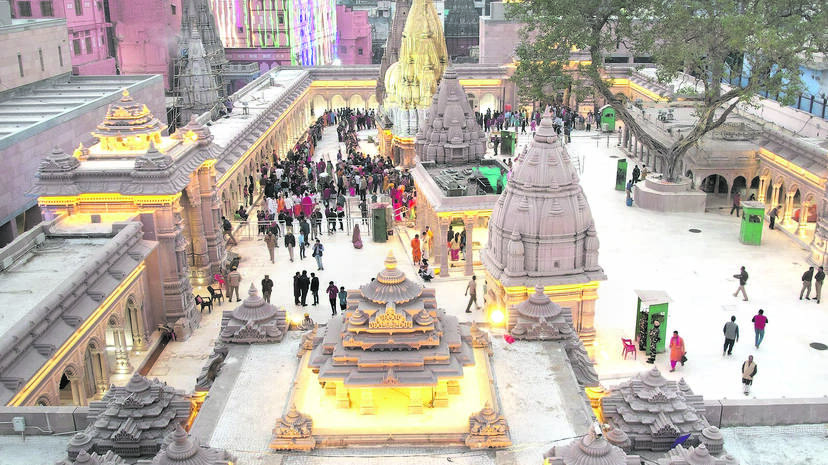Table of Contents
- Introduction
- Origin of the Temple
- Historical Significance of the Temple
- The Temple Over the Centuries
- The Current Temple Structure
- Religious Significance of the Temple Today
- Daily rituals and ceremonies:
- Significance for pilgrims and devotees
- Conclusion
- Final thoughts on the significance of the Kashi Vishwanath Temple
Introduction
The Kashi Vishwanath Temple is a Hindu temple located in Varanasi, India. It is dedicated to Lord Shiva, who is also known as Kashi Vishwanath or the Lord of the city of Kashi. The temple has a rich history that spans several centuries and has been mentioned in various Hindu scriptures and holy books.
The significance of the temple lies in its religious importance to Hindus. The temple is one of the 12 Jyotirlingas, which are considered to be the most sacred shrines of Lord Shiva. The temple is also considered to be one of the seven holiest places in Hinduism, and is believed to be a powerful site for spiritual enlightenment and liberation from the cycle of birth and death.
Origin of the Temple
The origin of the temple is said to date back to the 11th century. According to legend, the temple was built by the King of Kashi, Bhaskaravarman. However, the exact date of the temple’s construction is still unknown. The temple has a rich and fascinating history that has been passed down through generations of devotees.
Over the centuries, the temple has been destroyed and rebuilt several times. The temple has been subject to repeated invasions and attacks, and has been destroyed and reconstructed several times over the centuries. Despite this, the temple has always remained an important site of worship for Hindus.
Historical Significance of the Temple
The Kashi Vishwanath Temple has a rich history that is intertwined with Hinduism. The temple has been mentioned in various Hindu scriptures and holy books, and is considered to be one of the seven holiest places in Hinduism. The temple is also considered to be a powerful site for spiritual enlightenment and liberation from the cycle of birth and death.
The temple has played an important role in Hindu religion and culture, and has been a site of worship for generations of devotees. The temple has been a center of religious and spiritual activity for centuries, and continues to be so today.
The Temple Over the Centuries
Throughout its history, the Kashi Vishwanath Temple has undergone several renovations and additions. The temple has been destroyed and rebuilt several times, with the last time being in the late 18th century. The current temple structure was built by the Maratha ruler, Ahilyabai Holkar, in 1780.
The temple has undergone several renovations and additions over the centuries, and has been expanded and renovated several times to accommodate the growing number of devotees who come to worship at the temple. Despite these changes, the temple has always remained a sacred and revered site for Hindus.
The Current Temple Structure
The current temple structure is a stunning example of Hindu architecture. The temple has a tall tower, known as a shikhara, which is surrounded by smaller towers. The temple is adorned with intricate carvings and sculptures, and is considered to be one of the most beautiful temples in India.
The temple is a place of pilgrimage for Hindus from all over the world, and is considered to be one of the most important Hindu temples. The temple is also a popular tourist destination, attracting millions of visitors every year.
Religious Significance of the Temple Today
The Kashi Vishwanath Temple continues to be an important site of worship for Hindus today. The temple is a place of pilgrimage for Hindus from all over the world, and is considered to be one of the most important Hindu temples. The temple is also considered to be a powerful site for spiritual enlightenment and liberation from the cycle of birth and death.
Daily rituals and ceremonies:
The Kashi Vishwanath Temple is a bustling center of religious activity, with daily rituals and ceremonies taking place throughout the day. Devotees come to the temple to offer prayers, perform puja (worship), and seek blessings from Lord Shiva. The temple is also home to several priests who perform various rituals and ceremonies, such as the aarti (a ritual of worship in Hinduism) and the abhishek (a ritual of pouring milk, water, and other offerings over the deity).
Significance for pilgrims and devotees
The temple is considered to be a powerful site of spiritual significance, and attracts millions of pilgrims and devotees from all over the world. For many Hindus, visiting the Kashi Vishwanath Temple is a spiritual journey, and the temple is seen as a place of refuge and comfort for those in need. The temple is also considered to be a place of spiritual enlightenment and liberation, and is believed to have the power to grant blessings and bestow good fortune upon those who visit.
Conclusion
The Kashi Vishwanath Temple has a rich and fascinating history that spans several centuries. The temple has been mentioned in various Hindu scriptures and holy books, and is considered to be one of the seven holiest places in Hinduism. The temple has undergone several renovations and additions over the centuries, and continues to be a bustling center of religious activity and a site of pilgrimage for Hindus from all over the world.
Final thoughts on the significance of the Kashi Vishwanath Temple
The Kashi Vishwanath Temple is an important symbol of Hindu religion and culture, and its significance extends far beyond its walls. The temple is a place of refuge and comfort for those in need, and is considered to be a powerful site for spiritual enlightenment and liberation. The temple’s rich history and ongoing religious significance make it a truly unique and special place, and it is a testament to the enduring power of Hinduism and the devotion of its followers.
